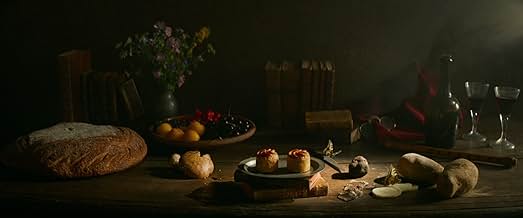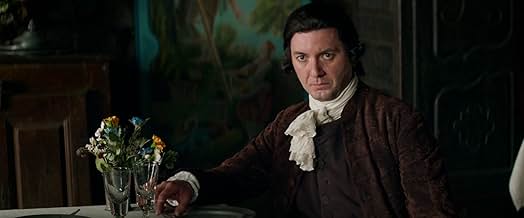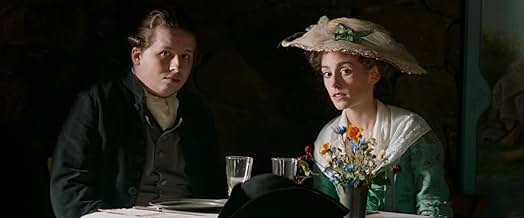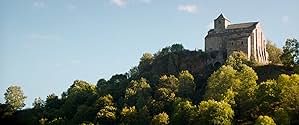Délicieux
- 2021
- Tous publics
- 1h 52m
IMDb RATING
7.0/10
6.6K
YOUR RATING
France, 1789, just before the Revolution. With the help of a surprising talented young woman, a chef who has been sacked by his noble master finds the strength to free himself from his posit... Read allFrance, 1789, just before the Revolution. With the help of a surprising talented young woman, a chef who has been sacked by his noble master finds the strength to free himself from his position as a servant and opens the first ever restaurant.France, 1789, just before the Revolution. With the help of a surprising talented young woman, a chef who has been sacked by his noble master finds the strength to free himself from his position as a servant and opens the first ever restaurant.
- Director
- Writers
- Stars
- Awards
- 3 nominations total
- Director
- Writers
- All cast & crew
- Production, box office & more at IMDbPro
Featured reviews
After chef Manceron is sacked by his fussy aristocratic boss, a woman appears out of nowhere and asks him to let her be an apprentice chef. He is unwilling as he thinks that chefs should all be males. She hands him some money for her tuition fees and finally pursuades him to teach her. He teaches her how to identify plants suitable for eating, and how to cook animals. She becomes an excellent cook, and we see some of the delicious looking food that she produces. We learn about the poverty of the local peasants and how many are starving. The arrogance and condescending attitude of the Duc de Chamfort and his fellow aristocrats give us a taste of the unfair treatment given to the poorer people which eventually led to the French Revolution.
It's set in 1789 France just before the Revolution in a rural fictional dukedom of Chamfort. It tells the story of the invention of the modern restaurant concept in a time when only the nobility ate well.
Pierre Manceron (Grégory Gadebois) is the master chef for Le duc de Chamfort (Benjamin Lavernhe). Chamfort loves Manceron's cooking, but insists that he stick to set menus and not be creative in his recipes. When Manceron creates a little appetizer he calls "Délicieux" that contains potato, Manceron is dismissed after refusing to apologize for serving such a dish.
He returns to his rural home with his son, Benjamin (Lorenzo Lefèbvre), and together with an elderly mentor, Jacob (Christian Bouilette) runs a relay (postal) station that also serves basic food. Suddenly, a mysterious woman appears and asks to be Manceron's cooking apprentice. Louise (Isabelle Carré) claims to a former jam maker, but Manceron believes she actually must have been a prostitute. He refuses to accept her for a time, but ultimately agrees to train her.
They create dishes based on local produce and local livestock, and begin to attract a significant clientele. The duke is intrigued, misses his cook who he has not been able satisfactorily to replace, and offers to stop by for a traditional feast. If successful he'll invite Manceron back into service.
The film then takes a sharp departure into the pre-Revolution politics of the day, we learn the truth of Louise's background, and the story unfolds in unexpected ways.
This is beautifully-filmed movie. The scenes of food preparation reminded me of "Babette's Feast." The unfolding interaction between Manceron, Benjamin (who is pro-class struggle), and Louise is well done. The sharp departure two-thirds of the way into the movie started to to make it go off the rails for me. I expect minimal plausibility in historical films; this one drifted too far in its link to the French Revolution and ended somewhat unsatisfactorily.
Still, the cinematography and the initial storyline made it a good watch.
Pierre Manceron (Grégory Gadebois) is the master chef for Le duc de Chamfort (Benjamin Lavernhe). Chamfort loves Manceron's cooking, but insists that he stick to set menus and not be creative in his recipes. When Manceron creates a little appetizer he calls "Délicieux" that contains potato, Manceron is dismissed after refusing to apologize for serving such a dish.
He returns to his rural home with his son, Benjamin (Lorenzo Lefèbvre), and together with an elderly mentor, Jacob (Christian Bouilette) runs a relay (postal) station that also serves basic food. Suddenly, a mysterious woman appears and asks to be Manceron's cooking apprentice. Louise (Isabelle Carré) claims to a former jam maker, but Manceron believes she actually must have been a prostitute. He refuses to accept her for a time, but ultimately agrees to train her.
They create dishes based on local produce and local livestock, and begin to attract a significant clientele. The duke is intrigued, misses his cook who he has not been able satisfactorily to replace, and offers to stop by for a traditional feast. If successful he'll invite Manceron back into service.
The film then takes a sharp departure into the pre-Revolution politics of the day, we learn the truth of Louise's background, and the story unfolds in unexpected ways.
This is beautifully-filmed movie. The scenes of food preparation reminded me of "Babette's Feast." The unfolding interaction between Manceron, Benjamin (who is pro-class struggle), and Louise is well done. The sharp departure two-thirds of the way into the movie started to to make it go off the rails for me. I expect minimal plausibility in historical films; this one drifted too far in its link to the French Revolution and ended somewhat unsatisfactorily.
Still, the cinematography and the initial storyline made it a good watch.
This movie was a genuine pleasure to watch... in my book it ranks way up there with a few other movies that use food and cooking as the centerpiece around which the plot was built. Chef, The Hundred Foot Journey, The Big Night, Tortilla Soup, Babette's Feast, Burnt, Chocolat and Dinner Rush are the main ones that come to mind.
Delicious, and these others, stand out as exemplary stories... beautifully photographed, directed and acted.
The natural lighting used for interior scenes sets a very high standard for fellow cinematographers... The food looked so good I wanted to try "The Delicious" myself.
The directing was right up there with the work of Lasse Hallstrom.
And I will watch all day long the subtle acting of this fine ensemble cast... preferring it to the "obnoxious excess of personality" many actors bring to a role.
To sum it up............... incroyable !!!
Delicious, and these others, stand out as exemplary stories... beautifully photographed, directed and acted.
The natural lighting used for interior scenes sets a very high standard for fellow cinematographers... The food looked so good I wanted to try "The Delicious" myself.
The directing was right up there with the work of Lasse Hallstrom.
And I will watch all day long the subtle acting of this fine ensemble cast... preferring it to the "obnoxious excess of personality" many actors bring to a role.
To sum it up............... incroyable !!!
My Rating 9/10
I'm no expert on Foreign cinema but I know what I like and I liked Delicious very much .
I just judge any film in any language on my own test.
Just 3 criteria. : Was it well produced and enjoyable to watch ?
Was I interested in the characters and story.?
And were the performances convincing?
And this French film DÉLICIEUX (Delicious) gets a high score in each category from me.
Writer/director Éric Besnard's mouth-watering new historical comedy indelibly pairs Grégory Gadebois and Isabelle Carré as a gifted chef and his unlikely protégé, who must find the resolve to free themselves from servitude.
In 1789 France, just prior to the Revolution.
Very loosely based on true events because as my research informs me in reality, the first restaurant is generally considered to be Le Grande Taverne des Londres in Paris, which opened a handful years before Delicious is set. However it's refreshing to see a delightful film that imaginatively does a flavourful job of marrying an origin story of sorts with its French Revolution-adjacent historical context.
Delicious joins other films that feature gastronomical delights like Chocolat. Babette's Feast , Julie and Julia , Eat Drink Man Woman and No Reservations but it's more than just a foodie movie it's intelligent heart warming and very entertaining.
I'm no expert on Foreign cinema but I know what I like and I liked Delicious very much .
I just judge any film in any language on my own test.
Just 3 criteria. : Was it well produced and enjoyable to watch ?
Was I interested in the characters and story.?
And were the performances convincing?
And this French film DÉLICIEUX (Delicious) gets a high score in each category from me.
Writer/director Éric Besnard's mouth-watering new historical comedy indelibly pairs Grégory Gadebois and Isabelle Carré as a gifted chef and his unlikely protégé, who must find the resolve to free themselves from servitude.
In 1789 France, just prior to the Revolution.
Very loosely based on true events because as my research informs me in reality, the first restaurant is generally considered to be Le Grande Taverne des Londres in Paris, which opened a handful years before Delicious is set. However it's refreshing to see a delightful film that imaginatively does a flavourful job of marrying an origin story of sorts with its French Revolution-adjacent historical context.
Delicious joins other films that feature gastronomical delights like Chocolat. Babette's Feast , Julie and Julia , Eat Drink Man Woman and No Reservations but it's more than just a foodie movie it's intelligent heart warming and very entertaining.
Cinematography is the strongest aspect of this film. Some scenes look like paintings by Dutch Golden Age or Flemish Baroque artists. I had to pause several times to admire the tables tastefully laid with food. However, the main focus of the plot is not on food, like most of the reviewers seem to think. It shows the viewer why revolutions happen. Up until the rather stupid, highly unrealistic Hollywood-style happy ending. I guess the ending is the reason the film is listed as a comedy? Which it is not.
Did you know
- TriviaVery loosely based on true events as the first restaurants in France around 1789 emerged in Paris, not the countryside. Furthermore, the movie is not historically correct either by claiming that the first restaurant was created in France. The modern concept of a restaurant was already happening 600 years before in China circa 1100.
- Crazy creditsAt the end of the credits, there is a short clip of a table, with two 'Delicious' set amidst items of food, flowers, wine, etc, while some butterflies flutter about.
- How long is Delicious?Powered by Alexa
Details
Box office
- Budget
- €5,000,000 (estimated)
- Gross worldwide
- $8,371,523
- Runtime1 hour 52 minutes
- Color
- Aspect ratio
- 2.39 : 1
Contribute to this page
Suggest an edit or add missing content































